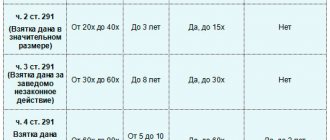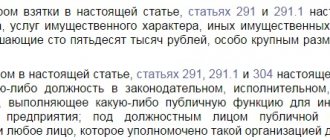ST 304 of the Criminal Code of the Russian Federation.
Provocation of a bribe, commercial bribery or bribery in the field of procurement of goods, works, services to meet state or municipal needs, that is, an attempt to transfer to an official, a foreign official, an official of a public international organization, a person performing managerial functions in commercial or other organizations, or to the person specified in part one of Article 200.5 of this Code, without his consent, money, securities, other property or the provision of property services to him, the provision of other property rights for the purpose of artificially creating evidence of a crime or blackmail, -
shall be punishable by a fine in the amount of up to two hundred thousand rubles or in the amount of the wages or other income of the convicted person for a period of up to eighteen months, or by forced labor for a term of up to five years with or without deprivation of the right to hold certain positions or engage in certain activities for a period of up to three years, or imprisonment for a term of up to five years with or without deprivation of the right to hold certain positions or engage in certain activities for a term of up to three years.
Provocation of a bribe in the history of the Russian Federation
Provocation as an effective tool in the fight against bribe-takers has been widely used since the times of Tsarist and then Soviet Russia. It was first banned only in 1922, when the fight against bribe-takers was particularly active. Until 1926, only provocation to give a bribe remained criminal. Then Art. 119 of the Criminal Code of the RSFSR - it also made provocation of receiving, that is, inciting a citizen to offer an unlawful benefit in order to expose the bribe-giver, criminal .
In the 1960 code, there was no provocation of a bribe as a special crime. However, police officers were still brought to justice: incitement to bribe, as the use of their position to the detriment of the interests of the service, was classified as abuse of power .
From 1996 to today, a modern code has been in force, which includes Art. 304 of the Criminal Code, “Provocation of a bribe or commercial bribery.” Thus, over the last century, domestic criminal legislation has, in one way or another, considered inducing officials to obtain unlawful benefits as a crime.
Provocation as a way to identify bribe takers
Provocation is a way of artificially creating an evidence base , inciting a crime. It is expressed in an attempt to transfer a bribe (money, other valuables, provision of property services) to an official of a private or public enterprise, organization, institution or service without the consent of this official (Article 304 of the Criminal Code).
In legal circles, the modern definition of provocation is considered controversial. This is also related to the conflicting assessments of judges when considering cases of incitement to give a bribe in judicial practice. Only the Supreme Court was able to provide clarity and specific criteria for assessment.
Commentary to Art. 304 of the Criminal Code
1. The subject of the crime is money, securities, other property, services of a property nature, and other property rights. For their concept, see comments to Art. 204, 290 CC.
The victim is an official, a foreign official, an official of a public international organization or a person performing managerial functions in commercial or other organizations. For the concept of these persons, see the comments to Art. 201, 285 CC.
2. The objective side is expressed in the form of actions: in an attempt, without the consent of the victim: a) to transfer money, securities, other property to him; b) provide him with services of a property nature; c) provide other property rights. The designated actions must be real in nature and recorded on specialized equipment (audio, video recording, etc.) or have witnesses to achieve the designated goals. An attempt to transfer these items can be made directly, through deception, or unnoticed by the victim. Lack of consent means that the victim’s prior consent to these actions was not obtained.
3. The crime is recognized as completed from the moment of transfer of property or provision of services of a property nature without the knowledge of an official or person performing managerial functions in a commercial or other organization, or despite their refusal to accept illegal remuneration.
4. The actions of a person who is not aware of the provocation, who succumbed to persuasion and accepted the specified items, may be qualified as an attempt to commit crimes under Art. 204 or 290 CC.
5. The subjective side is characterized by direct intent and the goals of artificially creating evidence of a crime or blackmail. This crime must be distinguished from bribery (Article 291) and commercial bribery (Parts 1 - 4, Article 204) in terms of goals and intent.
Clarifications of the Supreme Court
Firstly, the Supreme Court identified in paragraph 32 of the Resolution of the Plenum of the Supreme Court of the Russian Federation No. 24 of 07/09/2013 two main signs of provocation :
- Money or valuables must be transferred to an official for the purpose of artificially forming an evidence base .
- The official did not agree to accept money or other valuables or clearly refused to accept them.
Secondly, he determined the moment of the end of the crime: this is the moment of transfer of money/property to an official without his knowledge or despite his refusal. If an official agreed to accept a bribe, the qualifications and actions of the operatives are legal, they should not, under Art. 304 CC .
Thirdly, the Supreme Court recommends distinguishing incitement to receive a bribe from provocation. If the operatives clearly persuaded the official to accept a bribe and without their participation the criminal plan would not have arisen and the crime would not have been committed, there is no corpus delicti , even if the official gave his consent to accept the unlawful benefit (clause 34 of the PVS Resolution No. 24).
Commentary on Article 304
1. Provocation in general is understood as the deliberate creation of a situation that pushes, compels or facilitates the victim to commit actions that are beneficial to the provocateur (including criminal ones). In this case, the receipt of a bribe or commercial bribery is provoked (for the concepts of bribe, commercial bribery, official, etc., see Articles 285, 290, 201, 204 and comments thereto). Artificially created circumstances, in this case through provocation, cannot serve as evidence of an accusation of receiving a bribe (bribery), they are unacceptable by ethical standards and are recognized as a crime, like any other falsification of evidence (see Article 303 and the commentary thereto).
2. The objective side of the crime in question is to create conditions that, in turn, should create the appearance that an official (or a corresponding person in a commercial organization) has received money or other property as a bribe. This may be an attempt to transfer money or property in front of witnesses, in conditions of secret photography, while recording the words spoken at the same time on a tape recorder, or under other circumstances, which should subsequently serve as “evidence” of receiving a bribe (bribery). The mere verbal offer of a bribe (bribery) does not constitute this crime, but should be qualified as incitement to receive a bribe (bribery). It is important to emphasize that the actions specified in the article are carried out deliberately and with the aim of artificially creating evidence of receiving a bribe, in order to subsequently use this “evidence” to “expose” the person guilty of receiving a bribe or to blackmail him. The actions described in the article differ from the actual transfer of a bribe (bribery) in two ways. Firstly, when giving a bribe (bribery), a different goal is pursued: to force an official to perform certain actions in the interests of the giver (or to refrain from actions). This is not the case here. Secondly, the actions in question are committed without the consent of the official (i.e., against his will). Lack of consent is expressed primarily in a direct refusal to take the offered item, indignation of an official, calling witnesses, reporting to the police, etc.; but there may also be cases when money (property) is transferred to the victim without his knowledge (putting it in his pocket, in a car, in furniture; transferring money to his bank account, etc.). It is significant that the consent of the victim to receive a bribe (bribery) did not take place, that is, it was not expressed in any form.
3. The corpus delicti is completed at the moment of the attempt to transfer money (property). Subsequent actions of the victim, as well as the provocateur (for example, searching the premises, showing film and photographic documents, etc.) are outside the scope of the crime, but may be important in proving the goals and motives of the crime.
4. The subject of a crime can be either an official (for example, a law enforcement officer who is confident that he is exposing the real criminal) or a private person (for example, in the case of blackmail).
5. The subjective side is characterized by direct intent and purpose specified in the disposition of the commented article.
Scientific and practical commentary
:
1. The object is the normal activity of the court and the prosecutor’s office, inquiry and preliminary investigation, the additional one is the interests of the individual. The victim is an official or a person performing managerial functions in commercial or other organizations, the concepts of which are contained respectively in the notes to Art. Art. 285 and 201 of the Criminal Code. 2. The objective side is expressed in the provocation of a bribe or commercial bribery, i.e. in an attempt to transfer to an official or a person performing managerial functions in commercial or other organizations, without his consent, money, securities, other property or to provide him with services of a property nature for the purpose of artificially creating evidence or blackmail. The concepts of bribery and commercial bribery are enshrined by the legislator in Art. Art. 290 and 204 of the Criminal Code. The essence of provocation is revealed in the law itself and consists of an attempt to transfer a bribe without the consent of the person to whom it is intended (the victim himself, his relatives or friends, colleagues for subsequent transfer to the recipient, etc.). Lack of consent means that the official or person performing managerial functions did not openly or covertly demand the transfer of a bribe or commercial bribery and did not express a willingness to accept illegal remuneration. 3. The crime has a formal structure and is considered completed from the moment the actions specified in the law are committed. 4. From the subjective side, a crime can only be committed with direct intent. The law specifies the purpose as a mandatory feature: artificial creation of evidence of a crime or blackmail. 5. Subject - a person who has reached the age of 16 years.
Responsibility for provoking a bribe: to whom and how much
To liability under Art. 304 of the Criminal Code, as a rule, special subjects are involved - usually operatives. In order for “provocateurs” to be held accountable, they must be aware of the provocative nature of their actions. The purpose of provocation is to create the appearance of receiving unlawful benefits, the generation of false data, the purpose of which is to prepare “poor quality” evidence . If this is proven, the operatives will be held accountable under Art. 304 of the Criminal Code, they are threatened by:
- up to 200 thousand rubles fine;
- up to 5 years of forced labor + up to 3 years of ban on holding positions;
- up to 5 years in prison + up to 3 years ban on holding positions.
The basis for qualifying the actions of the operatives as a provocation of a bribe is a complaint from the injured official. Usually it is submitted as one of the lines of defense when charges are brought against officials under Art. 290 of the Criminal Code for obtaining unlawful benefits.
Arbitrage practice
In fact, there are no examples of successful use and evidence of the guilt of operatives in committing a crime under Art. 304 of the Criminal Code are few, and there is no uniform judicial practice on provoking a bribe in this matter. For example, in paragraph 3 of the Generalization of judicial practice for 2013-2014 in the courts of the Yamal-Nenets Autonomous Okrug, a case is described when the appeal acquitted the doctor of the district clinic, recognizing the transfer of a bribe to him as part of an operational experiment as a provocation, since:
- the operational experiment was carried out on the basis of some undocumented “operational information”;
- the “provocateurs” who gave the doctor money did not inform the operatives that they were being extorted;
- The “provocateurs” were not going to see a doctor if the police had not sent them there.
In another similar situation, the court does not take into account the fact that the “provocateur” persuades the official to talk about a bribe, and finds him guilty - there is no provocation (Determination No. 22-932/2014 of 08/21/2014). The courts make the same conclusions, even if the defendants point to direct instructions in the transfer of money from the operatives (resolution of the regional court of the Tver region No. 44U-99/2015).
Judicial practice under Article 304 of the Criminal Code of the Russian Federation
Determination of the Constitutional Court of the Russian Federation dated 06/05/2018 N 1404-O
Bearing in mind the logic of the construction of the criminal law, including general and special, as well as ordinary and qualified elements, the absence in Article 304 of the Criminal Code of the Russian Federation of such an aggravating feature as committing provocation of a bribe or commercial bribery using official (official) position (a sign that objectively makes the act more dangerous than the usual such provocation), does not allow us to assume that the provocation of a bribe or commercial bribery should absorb the crime provided for in part three of Article 286 of this Code, when they are combined in committed, and taking into account the maximum punishment in the sanction of this norm (imprisonment for a term of three to ten years with deprivation of the right to hold certain positions or engage in certain activities for a term of up to three years) in comparison with the sanction of its article 304 (imprisonment for a term up to five years with deprivation of the said right for up to three years or without it), there is no reason to assume that the legislator intended to reduce liability for a more dangerous crime only because it was expressed in such a provocation.
Resolution of the Plenum of the Supreme Court of the Russian Federation dated December 24, 2019 N 59
“In order to ensure uniform application by courts of legislation on liability for bribery (Articles 290, 291, 291.1, 291.2 of the Criminal Code of the Russian Federation) and other corruption crimes (in particular, those provided for in Articles 159, 160, 184, 200.5, 204, 204.1, 204.2, 292, 304 of the Criminal Code of the Russian Federation), as well as in connection with issues raised by the courts, the Plenum of the Supreme Court of the Russian Federation, guided by Article 126 of the Constitution of the Russian Federation, Articles 2 and 5 of the Federal Constitutional Law of February 5, 2014 No. 3-FKZ “On the Supreme Court of the Russian Federation” Federation”, decides to give the following clarifications to the courts: “;





